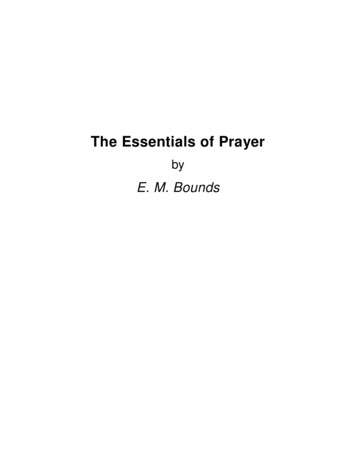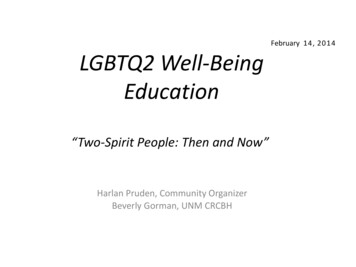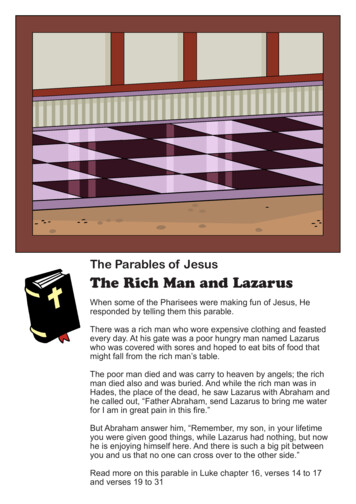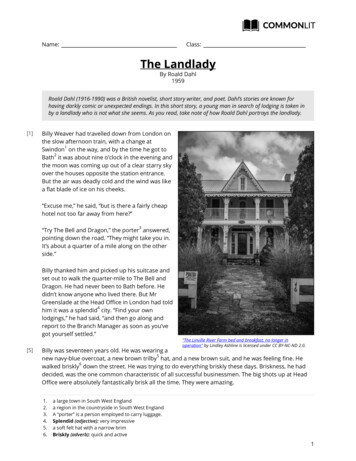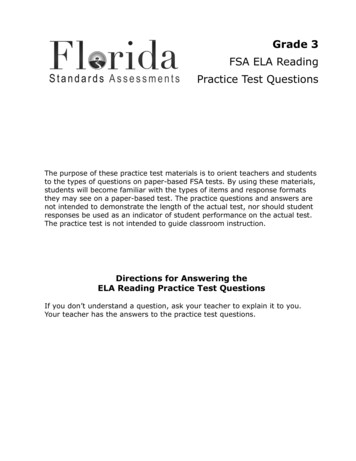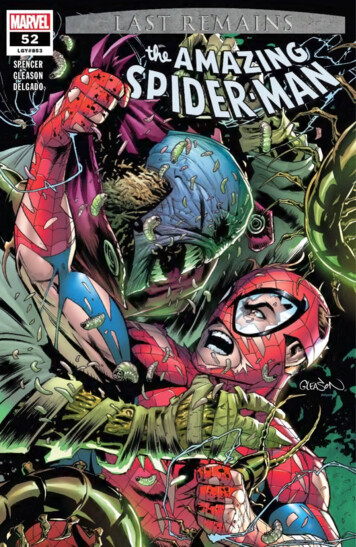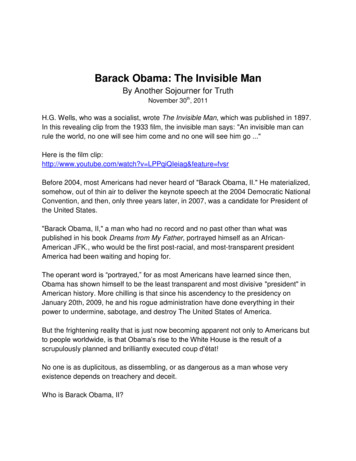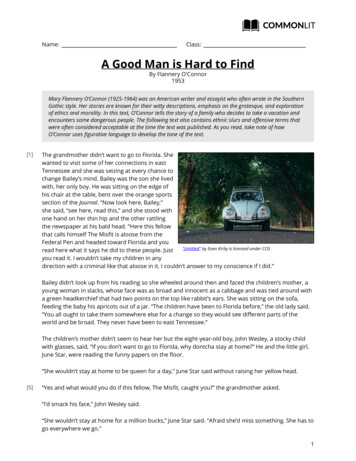
Transcription
Name:Class:A Good Man is Hard to FindBy Flannery O'Connor1953Mary Flannery O’Connor (1925-1964) was an American writer and essayist who often wrote in the SouthernGothic style. Her stories are known for their witty descriptions, emphasis on the grotesque, and explorationof ethics and morality. In this text, O’Connor tells the story of a family who decides to take a vacation andencounters some dangerous people. The following text also contains ethnic slurs and offensive terms thatwere often considered acceptable at the time the text was published. As you read, take note of howO’Connor uses figurative language to develop the tone of the text.[1]The grandmother didn’t want to go to Florida. Shewanted to visit some of her connections in eastTennessee and she was seizing at every chance tochange Bailey’s mind. Bailey was the son she livedwith, her only boy. He was sitting on the edge ofhis chair at the table, bent over the orange sportssection of the Journal. “Now look here, Bailey,”she said, “see here, read this,” and she stood withone hand on her thin hip and the other rattlingthe newspaper at his bald head. “Here this fellowthat calls himself The Misfit is aloose from theFederal Pen and headed toward Florida and you"Untitled" by Evan Kirby is licensed under CC0.read here what it says he did to these people. Justyou read it. I wouldn’t take my children in anydirection with a criminal like that aloose in it. I couldn’t answer to my conscience if I did.”Bailey didn’t look up from his reading so she wheeled around then and faced the children’s mother, ayoung woman in slacks, whose face was as broad and innocent as a cabbage and was tied around witha green headkerchief that had two points on the top like rabbit’s ears. She was sitting on the sofa,feeding the baby his apricots out of a jar. “The children have been to Florida before,” the old lady said.“You all ought to take them somewhere else for a change so they would see different parts of theworld and be broad. They never have been to east Tennessee.”The children’s mother didn’t seem to hear her but the eight-year-old boy, John Wesley, a stocky childwith glasses, said, “If you don’t want to go to Florida, why dontcha stay at home?” He and the little girl,June Star, were reading the funny papers on the floor.“She wouldn’t stay at home to be queen for a day,” June Star said without raising her yellow head.[5]“Yes and what would you do if this fellow, The Misfit, caught you?” the grandmother asked.“I’d smack his face,” John Wesley said.“She wouldn’t stay at home for a million bucks,” June Star said. “Afraid she’d miss something. She has togo everywhere we go.”1
“All right, Miss,” the grandmother said. “Just remember that the next time you want me to curl yourhair.”June Star said her hair was naturally curly.[10]The next morning the grandmother was the first one in the car, ready to go. She had her big black1valise that looked like the head of a hippopotamus in one corner, and underneath it she was hiding abasket with Pitty Sing, the cat, in it. She didn’t intend for the cat to be left alone in the house for threedays because he would miss her too much and she was afraid he might brush against one of the gas2burners and accidentally asphyxiate himself. Her son, Bailey, didn’t like to arrive at a motel with a cat.She sat in the middle of the back seat with John Wesley and June Star on either side of her. Bailey andthe children’s mother and the baby sat in front and they left Atlanta at eight forty-five with the mileageon the car at 55890. The grandmother wrote this down because she thought it would be interesting tosay how many miles they had been when they got back. It took them twenty minutes to reach theoutskirts of the city.The old lady settled herself comfortably, removing her white cotton gloves and putting them up withher purse on the shelf in front of the back window. The children’s mother still had on slacks and stillhad her head tied up in a green kerchief, but the grandmother had on a navy blue straw sailor hat witha bunch of white violets on the brim and a navy blue dress with a small white dot in the print. Her3collars and cuffs were white organdy trimmed with lace and at her neckline she had pinned a purple45spray of cloth violets containing a sachet. In case of an accident, anyone seeing her dead on thehighway would know at once that she was a lady.She said she thought it was going to be a good day for driving, neither too hot nor too cold, and shecautioned Bailey that the speed limit was fifty-five miles an hour and that the patrolmen hidthemselves behind billboards and small clumps of trees and sped out after you before you had a6chance to slow down. She pointed out interesting details of the scenery: Stone Mountain; the bluegranite that in some places came up to both sides of the highway; the brilliant red clay banks slightlystreaked with purple; and the various crops that made rows of green lace-work on the ground. Thetrees were full of silver-white sunlight and the meanest of them sparkled. The children were readingcomic magazines and their mother had gone back to sleep.“Let’s go through Georgia fast so we won’t have to look at it much,” John Wesley said.[15]“If I were a little boy,” said the grandmother, “I wouldn’t talk about my native state that way. Tennesseehas the mountains and Georgia has the hills.”“Tennessee is just a hillbilly dumping ground,” John Wesley said, “and Georgia is a lousy state too.”“You said it,” June Star said.1.2.3.4.5.6.a traveling bag or suitcaseto kill someone by depriving them of aira fine translucent cotton or silk fabric that is usually stiffened and used for women’s clothinga flowering branch or shoota small perfume bag used to scent clothesStone Mountain is a large granite mass east of Atlanta, Georgia, and the site of the Confederate Memorial Carving,which features the figures of Jefferson Davis, Robert E. Lee, and Thomas "Stonewall" Jackson.2
“In my time,” said the grandmother, folding her thin veined fingers, “children were more respectful oftheir native states and their parents and everything else. People did right then. Oh look at the cute little7pickaninny!” she said and pointed to a Negro child standing in the door of a shack. “Wouldn’t thatmake a picture, now?” she asked and they all turned and looked at the little Negro out of the backwindow. He waved.“He didn’t have any britches on,” June Star said.[20]8“He probably didn’t have any,” the grandmother explained. “Little niggers in the country don’t havethings like we do. If I could paint, I’d paint that picture,” she said.The children exchanged comic books.The grandmother offered to hold the baby and the children’s mother passed him over the front seat toher. She set him on her knee and bounced him and told him about the things they were passing. Sherolled her eyes and screwed up her mouth and stuck her leathery thin face into his smooth bland one.Occasionally he gave her a faraway smile. They passed a large cotton field with five or six graves fencedin the middle of it, like a small island. “Look at the graveyard!” the grandmother said, pointing it out.“That was the old family burying ground. That belonged to the plantation.”“Where’s the plantation?” John Wesley asked.9“Gone With the Wind,” said the grandmother. “Ha. Ha.”[25]When the children finished all the comic books they had brought, they opened the lunch and ate it. Thegrandmother ate a peanut butter sandwich and an olive and would not let the children throw the boxand the paper napkins out the window. When there was nothing else to do they played a game bychoosing a cloud and making the other two guess what shape it suggested. John Wesley took one theshape of a cow and June Star guessed a cow and John Wesley said, no, an automobile, and June Starsaid he didn’t play fair, and they began to slap each other over the grandmother.The grandmother said she would tell them a story if they would keep quiet. When she told a story, sherolled her eyes and waved her head and was very dramatic. She said once when she was a maiden ladyshe had been courted by a Mr. Edgar Atkins Teagarden from Jasper, Georgia. She said he was a verygood-looking man and a gentleman and that he brought her a watermelon every Saturday afternoonwith his initials cut in it, E. A. T. Well, one Saturday, she said, Mr. Teagarden brought the watermelonand there was nobody at home and he left it on the front porch and returned in his buggy to Jasper,but she never got the watermelon, she said, because a nigger boy ate it when he saw the initials, E. A.T.! This story tickled John Wesley’s funny bone and he giggled and giggled but June Star didn’t think itwas any good. She said she wouldn’t marry a man that just brought her a watermelon on Saturday. Thegrandmother said she would have done well to marry Mr. Teagarden because he was a gentleman andhad bought Coca-Cola stock when it first came out and that he had died only a few years ago, a verywealthy man.7.8.9.an offensive term for a small black childan offensive term and racial slur towards a black persona reference to the popular book and film about the daughter of a plantation owner during the Civil War era3
10They stopped at The Tower for barbecued sandwiches. The Tower was a part stucco and part woodfilling station and dance hall set in a clearing outside of Timothy. A fat man named Red Sammy Buttsran it and there were signs stuck here and there on the building and for miles up and down thehighway saying, TRY RED SAMMY’S FAMOUS BARBECUE. NONE LIKE FAMOUS RED SAMMY’S! RED SAM!THE FAT BOY WITH THE HAPPY LAUGH. A VETERAN! RED SAMMY’S YOUR MAN!Red Sammy was lying on the bare ground outside The Tower with his head under a truck while a graymonkey about a foot high, chained to a small chinaberry tree, chattered nearby. The monkey sprangback into the tree and got on the highest limb as soon as he saw the children jump out of the car andrun toward him.Inside, The Tower was a long dark room with a counter at one end and tables at the other and dancing11space in the middle. They all sat down at a board table next to the nickelodeon and Red Sam’s wife, atall burnt-brown woman with hair and eyes lighter than her skin, came and took their order. Thechildren’s mother put a dime in the machine and played “The Tennessee Waltz,” and the grandmothersaid that tune always made her want to dance. She asked Bailey if he would like to dance but he onlyglared at her. He didn’t have a naturally sunny disposition like she did and trips made him nervous. Thegrandmother’s brown eyes were very bright. She swayed her head from side to side and pretended shewas dancing in her chair. June Star said play something she could tap to so the children’s mother put inanother dime and played a fast number and June Star stepped out onto the dance floor and did hertap routine.[30]“Ain’t she cute?” Red Sam’s wife said, leaning over the counter. “Would you like to come be my littlegirl?”“No I certainly wouldn’t,” June Star said. “I wouldn’t live in a broken-down place like this for a millionbucks!” and she ran back to the table.“Ain’t she cute?” the woman repeated, stretching her mouth politely.“Arn’t you ashamed?” hissed the grandmother.Red Sam came in and told his wife to quit lounging on the counter and hurry up with these people’sorder. His khaki trousers reached just to his hip bones and his stomach hung over them like a sack of12meal swaying under his shirt. He came over and sat down at a table nearby and let out a combinationsigh and yodel. “You can’t win,” he said. “You can’t win,” and he wiped his sweating red face off with agray handkerchief. “These days you don’t know who to trust,” he said. “Ain’t that the truth?”[35]“People are certainly not nice like they used to be,” said the grandmother.“Two fellers come in here last week,” Red Sammy said, “driving a Chrysler. It was a old beat-up car but itwas a good one and these boys looked all right to me. Said they worked at the mill and you know I letthem fellers charge the gas they bought? Now why did I do that?”“Because you’re a good man!” the grandmother said at once.10.11.12.fine plastera jukebox, or a coin operated mechanical, musical instrumenta powdery substance made by grinding4
“Yes’m, I suppose so,” Red Sam said as if he were struck with this answer.His wife brought the orders, carrying the five plates all at once without a tray, two in each hand andone balanced on her arm. “It isn’t a soul in this green world of God’s that you can trust,” she said. “And Idon’t count nobody out of that, not nobody,” she repeated, looking at Red Sammy.[40]“Did you read about that criminal, The Misfit, that’s escaped?” asked the grandmother.“I wouldn’t be a bit surprised if he didn’t attack this place right here,” said the woman. “If he hearsabout it being here, I wouldn’t be none surprised to see him. If he hears it’s two cent in the cashregister, I wouldn’t be a tall surprised if he.”“That’ll do,” Red Sam said. “Go bring these people their Co’-Colas,” and the woman went off to get therest of the order.“A good man is hard to find,” Red Sammy said. “Everything is getting terrible. I remember the day youcould go off and leave your screen door unlatched. Not no more.”He and the grandmother discussed better times. The old lady said that in her opinion Europe wasentirely to blame for the way things were now. She said the way Europe acted you would think we weremade of money and Red Sam said it was no use talking about it, she was exactly right. The children ranoutside into the white sunlight and looked at the monkey in the lacy chinaberry tree. He was busycatching fleas on himself and biting each one carefully between his teeth as if it were a delicacy.[45]They drove off again into the hot afternoon. The grandmother took cat naps and woke up every fewminutes with her own snoring. Outside of Toombsboro she woke up and recalled an old plantationthat she had visited in this neighborhood once when she was a young lady. She said the house had sixwhite columns across the front and that there was an avenue of oaks leading up to it and two little1314wooden trellis arbors on either side in front where you sat down with your suitor after a stroll in thegarden. She recalled exactly which road to turn off to get to it. She knew that Bailey would not bewilling to lose any time looking at an old house, but the more she talked about it, the more she wantedto see it once again and find out if the little twin arbors were still standing. “There was a secret panel inthis house,” she said craftily, not telling the truth but wishing that she were, “and the story went that all15the family silver was hidden in it when Sherman came through but it was never found.”“Hey!” John Wesley said. “Let’s go see it! We’ll find it! We’ll poke all the woodwork and find it! Who livesthere? Where do you turn off at? Hey Pop, can’t we turn off there?”“We never have seen a house with a secret panel!” June Star shrieked. “Let’s go to the house with thesecret panel! Hey Pop, can’t we go see the house with the secret panel!”“It’s not far from here, I know,” the grandmother said. “It wouldn’t take over twenty minutes.”Bailey was looking straight ahead. His jaw was as rigid as a horseshoe. “No,” he said.13.14.15.a framework of light wooden or metal bars, primarily used to support fruit trees or climbing plantsa garden structure marking a point of entry or the division of two places along a pathmost likely referring to military campaign conducted through Georgia by Major General William Tecumseh Shermanof the Union Army during the Civil War5
[50]The children began to yell and scream that they wanted to see the house with the secret panel. JohnWesley kicked the back of the front seat and June Star hung over her mother’s shoulder and whineddesperately into her ear that they never had any fun even on their vacation, that they could never dowhat THEY wanted to do. The baby began to scream and John Wesley kicked the back of the seat sohard that his father could feel the blows in his kidney.“All right!” he shouted and drew the car to a stop at the side of the road. “Will you all shut up? Will youall just shut up for one second? If you don’t shut up, we won’t go anywhere.”“It would be very educational for them,” the grandmother murmured.“All right,” Bailey said, “but get this: this is the only time we’re going to stop for anything like this. This isthe one and only time.”“The dirt road that you have to turn down is about a mile back,” the grandmother directed. “I marked itwhen we passed.”[55]“A dirt road,” Bailey groaned.After they had turned around and were headed toward the dirt road, the grandmother recalled otherpoints about the house, the beautiful glass over the front doorway and the candle-lamp in the hall.John Wesley said that the secret panel was probably in the fireplace.“You can’t go inside this house,” Bailey said. “You don’t know who lives there.”“While you all talk to the people in front, I’ll run around behind and get in a window,” John Wesleysuggested.“We’ll all stay in the car,” his mother said. They turned onto the dirt road and the car raced roughlyalong in a swirl of pink dust. The grandmother recalled the times when there were no paved roads andthirty miles was a day’s journey. The dirt road was hilly and there were sudden washes in it and sharpcurves on dangerous embankments. All at once they would be on a hill, looking down over the blue16tops of trees for miles around, then the next minute, they would be in a red depression with thedust-coated trees looking down on them.[60]“This place had better turn up in a minute,” Bailey said, “or I’m going to turn around.”The road looked as if no one had traveled on it in months.“It’s not much farther,” the grandmother said and just as she said it, a horrible thought came to her.The thought was so embarrassing that she turned red in the face and her eyes dilated and her feetjumped up, upsetting her valise in the corner. The instant the valise moved, the newspaper top shehad over the basket under it rose with a snarl and Pitty Sing, the cat, sprang onto Bailey’s shoulder.16.a sunken place or hollow on a surface6
The children were thrown to the floor and their mother, clutching the baby, was thrown out the dooronto the ground; the old lady was thrown into the front seat. The car turned over once and landed17right-side-up in a gulch off the side of the road. Bailey remained in the driver’s seat with the cat graystriped with a broad white face and an orange nose clinging to his neck like a caterpillar.As soon as the children saw they could move their arms and legs, they scrambled out of the car,shouting, “We’ve had an ACCIDENT!” The grandmother was curled up under the dashboard, hoping shewas injured so that Bailey’s wrath would not come down on her all at once. The horrible thought shehad had before the accident was that the house she had remembered so vividly was not in Georgia butin Tennessee.[65]Bailey removed the cat from his neck with both hands and flung it out the window against the side of apine tree. Then he got out of the car and started looking for the children’s mother. She was sittingagainst the side of the red gutted ditch, holding the screaming baby, but she only had a cut down herface and a broken shoulder. “We’ve had an ACCIDENT!” the children screamed in a frenzy of delight.“But nobody’s killed,” June Star said with disappointment as the grandmother limped out of the car, her18hat still pinned to her head but the broken front brim standing up at a jaunty angle and the violetspray hanging off the side. They all sat down in the ditch, except the children, to recover from theshock. They were all shaking.“Maybe a car will come along,” said the children’s mother hoarsely.“I believe I have injured an organ,” said the grandmother, pressing her side, but no one answered her.Bailey’s teeth were clattering. He had on a yellow sport shirt with bright blue parrots designed in it andhis face was as yellow as the shirt. The grandmother decided that she would not mention that thehouse was in Tennessee.The road was about ten feet above and they could see only the tops of the trees on the other side of it.Behind the ditch they were sitting in there were more woods, tall and dark and deep. In a few minutesthey saw a car some distance away on top of a hill, coming slowly as if the occupants were watchingthem. The grandmother stood up and waved both arms dramatically to attract their attention. The carcontinued to come on slowly, disappeared around a bend and appeared again, moving even slower, ontop of the hill they had gone over. It was a big black battered hearse-like automobile. There were threemen in it.[70]It came to a stop just over them and for some minutes, the driver looked down with a steadyexpressionless gaze to where they were sitting, and didn’t speak. Then he turned his head andmuttered something to the other two and they got out. One was a fat boy in black trousers and a red19sweat shirt with a silver stallion embossed on the front of it. He moved around on the right side ofthem and stood staring, his mouth partly open in a kind of loose grin. The other had on khaki pantsand a blue striped coat and a gray hat pulled down very low, hiding most of his face. He came aroundslowly on the left side. Neither spoke.17.18.19.a narrow and steep-sided ravineJaunty (adjective): lively in manner or appearanceto decorate or adorn something7
The driver got out of the car and stood by the side of it, looking down at them. He was an older manthan the other two. His hair was just beginning to gray and he wore silver-rimmed spectacles that gavehim a scholarly look. He had a long creased face and didn’t have on any shirt or undershirt. He had onblue jeans that were too tight for him and was holding a black hat and a gun. The two boys also hadguns.“We’ve had an ACCIDENT!” the children screamed.The grandmother had the peculiar feeling that the bespectacled man was someone she knew. His facewas as familiar to her as if she had known him all her life but she could not recall who he was. Hemoved away from the car and began to come down the embankment, placing his feet carefully so thathe wouldn’t slip. He had on tan and white shoes and no socks, and his ankles were red and thin. “Goodafternoon,” he said. “I see you all had you a little spill.”“We turned over twice!” said the grandmother.[75]“Oncet,” he corrected. “We seen it happen. Try their car and see will it run, Hiram,” he said quietly tothe boy with the gray hat.“What you got that gun for?” John Wesley asked. “Whatcha gonna do with that gun?”“Lady,” the man said to the children’s mother, “would you mind calling them children to sit down byyou? Children make me nervous. I want all you all to sit down right together there where you’re at.”“What are you telling US what to do for?” June Star asked.Behind them the line of woods gaped like a dark open mouth. “Come here,” said their mother.[80]“Look here now,” Bailey began suddenly, “we’re in a predicament! We’re in.”The grandmother shrieked. She scrambled to her feet and stood staring. “You’re The Misfit!” she said. “Irecognized you at once!”“Yes’m,” the man said, smiling slightly as if he were pleased in spite of himself to be known, “but itwould have been better for all of you, lady, if you hadn’t of reckernized me.”Bailey turned his head sharply and said something to his mother that shocked even the children. Theold lady began to cry and The Misfit reddened.“Lady,” he said, “don’t you get upset. Sometimes a man says things he don’t mean. I don’t reckon hemeant to talk to you thataway.”[85]“You wouldn’t shoot a lady, would you?” the grandmother said and removed a clean handkerchief fromher cuff and began to slap at her eyes with it.The Misfit pointed the toe of his shoe into the ground and made a little hole and then covered it upagain. “I would hate to have to,” he said.8
“Listen,” the grandmother almost screamed, “I know you’re a good man. You don’t look a bit like youhave common blood. I know you must come from nice people!”“Yes mam,” he said, “finest people in the world.” When he smiled he showed a row of strong whiteteeth. “God never made a finer woman than my mother and my daddy’s heart was pure gold,” he said.The boy with the red sweat shirt had come around behind them and was standing with his gun at hiship. The Misfit squatted down on the ground. “Watch them children, Bobby Lee,” he said. “You knowthey make me nervous.” He looked at the six of them huddled together in front of him and he seemedto be embarrassed as if he couldn’t think of anything to say. “Ain’t a cloud in the sky,” he remarked,looking up at it. “Don’t see no sun but don’t see no cloud neither.”“Yes, it’s a beautiful day,” said the grandmother. “Listen,” she said, “you shouldn’t call yourself The Misfitbecause I know you’re a good man at heart. I can just look at you and tell.”[90]“Hush!” Bailey yelled. “Hush! Everybody shut up and let me handle this!” He was squatting in theposition of a runner about to sprint forward but he didn’t move.“I pre-chate that, lady,” The Misfit said and drew a little circle in the ground with the butt of his gun.“It’ll take a half a hour to fix this here car,” Hiram called, looking over the raised hood of it.20“Well, first you and Bobby Lee get him and that little boy to step over yonder with you,” The Misfitsaid, pointing to Bailey and John Wesley. “The boys want to ast you something,” he said to Bailey.“Would you mind stepping back in them woods there with them?”“Listen,” Bailey began, “we’re in a terrible predicament! Nobody realizes what this is,” and his voicecracked. His eyes were as blue and intense as the parrots in his shirt and he remained perfectly still.[95]The grandmother reached up to adjust her hat brim as if she were going to the woods with him but itcame off in her hand. She stood staring at it and after a second she let it fall on the ground. Hirampulled Bailey up by the arm as if he were assisting an old man. John Wesley caught hold of his father’shand and Bobby Lee followed. They went off toward the woods and just as they reached the dark edge,Bailey turned and supporting himself against a gray naked pine trunk, he shouted, “I’ll be back in aminute, Mamma, wait on me!”“Come back this instant!” his mother shrilled but they all disappeared into the woods.“Bailey Boy!” the grandmother called in a tragic voice but she found she was looking at The Misfitsquatting on the ground in front of her. “I just know you’re a good man,” she said desperately. “You’renot a bit common!”20.at some distance in the direction indicated9
“Nome, I ain’t a good man,” The Misfit said after a second as if he had considered her statementcarefully, “but I ain’t the worst in the world neither. My daddy said I was a different breed of dog frommy brothers and sisters. ‘You know,’ Daddy said, ‘it’s some that can live their whole life out withoutasking about it and it’s others has to know why it is, and this boy is one of the latters. He’s going to beinto everything!’” He put on his black hat and looked up suddenly and then away deep into the woodsas if he were embarrassed again. “I’m sorry I don’t have on a shirt before you ladies,” he said, hunchinghis shoulders slightly. “We buried our clothes that we had on when we escaped and we’re just makingdo until we can get better. We borrowed these from some folks we met,” he explained.“That’s perfectly all right,” the grandmother said. “Maybe Bailey has an extra shirt in his suitcase.”[100] “I’ll look and see terrectly,” The Misfit said.“Where are they taking him?” the children’s mother screamed.21“Daddy was a card himself,” The Misfit said. “You couldn’t put anything over on him. He never got introuble with the Authorities though. Just had the knack of handling them.”“You could be honest too if you’d only try,” said the grandmother. “Think how wonderful it would be tosettle down and live a comfortable life and not have to think about somebody chasing you all the time.”The Misfit kept scratching in the ground with the butt of his gun as if he were thinking about it. “Yes’m,somebody is always after you,” he murmured.[105] The grandmother noticed how thin his shoulder blades were just behind his hat because she wasstanding up looking down on him. “Do you ever pray?” she asked.He shook his head. All she saw was the black hat wiggle between his shoulder blades. “Nome,” he said.There was a pistol shot from the woods, followed closely by another. Then silence. The old lady’s headjerked around. She could hear the wind move through the tree tops like a long satisfied insuck ofbreath. “Bailey Boy!” she called.“I was a gospel singer for a while,” The Misfit said. “I been most everything. Been in the arm service,22both land and sea, at home and abroad, been twict married, been an undertaker, been with therailroads, plowed Mother Earth, been in a tornado, seen a man burnt alive oncet,” and he looked up atthe children’s mother and the little girl who were sitting close together, their faces white and their eyes23glassy; “I even seen a woman flogged,” he said.“Pray, pray,” the grandmother began, “pray, pray.”[110] “I never was a bad boy that I remember of,” The Misfit said in an almost dreamy voice, “butsomewheres along the line I done something wrong and got sent to the penitentiary.alive,” and he looked up and held her attention to him by a steady stare.21.22.23.24.24I was burieda phrase meaning someone is witty or eccentrica person whose business is preparing dead bodies for burial or cremationto be beaten by someone with a whip or stick as punishmenta prison for people convicted for serious crimes10
“That’s when you should have started to pray,” she said “What did you do to get sent to the penitentiarythat first time?”“Turn to the right, it was a wall,” The Misfit said, looking up again at the cloudless sky. “Turn to the
A Good Man is Hard to Find By Flannery O'Connor 1953 Mary Flannery O'Connor (1925-1964) was an American writer and essayist who often wrote in the Southern Gothic style. Her stories are known for their witty descriptions, emphasis on the grotesque, and exploration of ethics and morality. In this text, O'Connor tells the story of a family .

